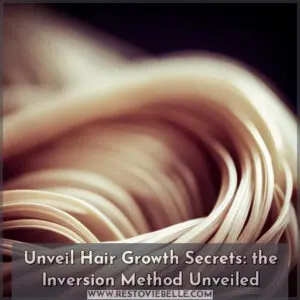This site is supported by our readers. We may earn a commission, at no cost to you, if you purchase through links.
 You’re absolutely right to explore biotin for hair growth.
You’re absolutely right to explore biotin for hair growth.
As a B vitamin, biotin plays a key role in maintaining healthy locks. Its deficiency can lead to hair loss and brittle strands.
Incorporating biotin-rich foods like eggs, nuts, and whole grains into your diet is ideal.
But supplements may be beneficial if you have an enzyme deficiency or uncombable hair syndrome.
The recommended daily intake is 30 mcg, but higher doses of 5-10 mg are advised for deficiencies.
Don’t worry, biotin is generally safe, though excessive intake may cause stomach issues.
To get the full picture on harnessing biotin for thicker, longer hair, let’s dive deeper.
Table Of Contents
- Key Takeaways
- Does Biotin Actually Help Hair Growth?
- How Much Biotin Should You Take for Hair Growth?
- What Types of Biotin Are There?
- Are There Any Side Effects of Taking Biotin?
- Who Should Not Take Biotin for Hair Growth?
- Frequently Asked Questions (FAQs)
- Does biotin actually help hair growth?
- How much biotin should I take for hair growth?
- What are the side effects of taking biotin?
- Who should not take biotin?
- How long does it take for biotin to work for hair growth?
- Can biotin cause hair loss or thinning in some people?
- Is biotin safe to take long-term for hair growth?
- Can biotin interact with any medications or supplements?
- Are there any other nutrients important for healthy hair growth?
- Conclusion
Key Takeaways
- Unleash biotin’s siren song to tame unruly tresses! This B vitamin superhero prevents hair loss due to deficiency and fortifies strands for a luscious mane.
- Don’t go overboard with the biotin supplements, though! While generally safe, excessive intake may trigger an ironic hair-thinning rebellion or stomach woes – a Catch-22 you’ll want to avoid.
- For those with an underlying biotin deficiency or conditions like uncombable hair syndrome, higher doses of 5-10 mg can be a game-changer in reversing hair loss and promoting regrowth. It’s like unlocking a secret haircare cheat code!
- Be patient, dear locks! Even with biotin on your side, it can take 6-12 weeks to witness the true extent of its hair-fortifying prowess. Good things come to those who wait, and thicker, longer locks are worth the anticipation.
Does Biotin Actually Help Hair Growth?
Biotin plays a vital role in hair growth, particularly in cases where a deficiency exists.
Symptoms of biotin deficiency like hair loss highlight its importance in maintaining healthy hair. In addition, inherited enzyme deficiencies and conditions like uncombable hair syndrome emphasize the need for adequate biotin levels for ideal hair health.
Studies have shown that biotin supplementation can effectively improve conditions such as brittle nail syndrome, indicating its efficacy in enhancing hair and nail strength.
Thus, in situations where biotin deficiency is a factor, supplementing with biotin can help address hair loss and promote healthier hair growth.
How Much Biotin Should You Take for Hair Growth?
The recommended daily intake of biotin for healthy adults is 30 mcg, but those looking to improve hair growth may benefit from higher doses. For individuals with an underlying biotin deficiency, doses ranging from 5-10 mg daily have been shown to help reverse hair loss and promote regrowth.
Recommended Daily Intake
The recommended daily intake of biotin for adults is 30 micrograms (mcg). However, pregnant women need slightly more at 35 mcg per day. Biotin deficiency is rare, as most people get sufficient amounts from a balanced diet and gut bacteria. Biotin-rich foods include liver, eggs, salmon, nuts, seeds, and whole grains .
Dosage for Specific Conditions
For specific conditions like biotinidase deficiency, uncombable hair syndrome, alopecia, or brittle nail syndrome, dosages of biotin can vary.
Essential dosages are effective based on individual variability, underlying medical conditions, and the severity of deficiency.
Addressing these concerns with appropriate doses is vital for effective treatment, highlighting the importance of personalized treatment regimens to counteract various issues related to biotin levels.
What Types of Biotin Are There?
When exploring biotin sources for hair growth, you’ll encounter biotin-rich foods like liver, eggs, and nuts. You can also find mega-B vitamin supplements containing concentrated biotin alongside other key nutrients, as well as biotin shampoos that claim to promote healthier locks topically, though evidence for their efficacy is limited.
Biotin-Rich Foods
Biotin-rich foods are a natural way to boost your biotin intake for hair growth. Eggs, nuts, legumes, whole grains, and unpolished rice are excellent sources (Source). Incorporating these foods into your diet can help prevent biotin deficiency, which can lead to hair loss . Biotin also plays a critical role in energy production and cell signaling .
Mega-B Vitamins
Mega-B vitamins, which include biotin, are a powerful combination for hair growth. Biotin is essential for keratin production, while other B vitamins support metabolism, skin health, and nervous system function. Look for supplements containing biotin plus vitamins B1, B2, B3, B5, B6, and B12 for a complete approach to thicker, stronger hair.
| Vitamin | Benefits |
|---|---|
| Biotin | Keratin production, hair growth |
| B1 | Metabolism, skin health |
| B2 | Metabolism, skin health |
| B3 | Metabolism, skin health |
| B5 | Metabolism, skin health |
| B6 | Metabolism, skin health |
| B12 | Metabolism, red blood cell formation, nervous system health |
Biotin Shampoo
Biotin shampoos may provide a convenient way to incorporate this essential nutrient into your hair care routine.
Look for formulas containing biotin, panthenol, and other nourishing ingredients. Apply daily for best results.
Biotin shampoos are suitable for all hair types. While not as potent as supplements, they offer a simple way to support hair health.
Avoid using biotin shampoos if you have an upcoming lab test, as they may interfere with results.
Are There Any Side Effects of Taking Biotin?
Biotin, a water-soluble vitamin B7, is generally well-tolerated. However, it may interfere with lab work, potentially leading to false readings and misdiagnoses of conditions such as hyperthyroidism and Graves’ disease. (Source)
Excessive intake of biotin can result in side effects like stomach issues, sleep disturbances, and skin rashes, but these are rare within recommended amounts.
Hence, it’s important to be mindful of biotin’s potential interactions and side effects when considering supplementation for hair growth. Understanding the dosage, safety precautions, and contraindications associated with biotin intake is essential to ensure its usage is appropriate and beneficial.
Who Should Not Take Biotin for Hair Growth?
While biotin is generally safe for most people, there are a few instances where you may want to avoid taking biotin supplements for hair growth.
If you have a biotin deficiency, biotin supplementation can help stimulate hair growth and prevent further loss. However, if you don’t have a deficiency, biotin supplements likely won’t provide any additional benefits for your hair.
Additionally, biotin can interfere with certain lab tests, leading to inaccurate results. If you have an upcoming blood test, it’s best to stop taking biotin supplements at least 72 hours beforehand.
Consult with your doctor to determine if biotin is right for you and to make sure it won’t interact with any medications you’re currently taking.
Frequently Asked Questions (FAQs)
Does biotin actually help hair growth?
Ever noticed your luscious locks thinning? Biotin may help. Though evidence is limited, this vitamin aids keratin production for stronger strands, preventing hair loss if deficient.
How much biotin should I take for hair growth?
For hair growth, 3mg (3,000mcg) of biotin daily is considered an ideal dosage. Assess your dietary intake first – if low, supplements can boost levels safely.
What are the side effects of taking biotin?
Like a siren’s call, biotin’s allure beckons, yet caution must prevail. While generally safe, side effects like acne, nausea, and fatigue may lurk for those who indulge excessively.
Who should not take biotin?
You shouldn’t take biotin if you have a biotinidase deficiency, which prevents breaking down excess biotin – potentially causing toxicity. Also avoid it before lab tests, as it can skew results.
How long does it take for biotin to work for hair growth?
Results take time. Experts recommend waiting 6-12 weeks before noticing improvements in hair growth from biotin supplementation. Individual results vary, though, so patience is key.
Can biotin cause hair loss or thinning in some people?
Like playing Russian roulette with your locks, excessive biotin can indeed backfire, potentially causing the dreaded hair thinning or loss in some. While rare, this ironic side-effect highlights the importance of moderation and consulting professionals for personalized guidance.
Is biotin safe to take long-term for hair growth?
Yes, biotin is generally safe for long-term use when taken within recommended dosages. However, extremely high doses should be avoided as they may interfere with lab tests or cause adverse effects.
Can biotin interact with any medications or supplements?
Yes, biotin can interact with certain medications. It may interfere with lab tests and provide inaccurate results. Consult your doctor before taking biotin supplements, especially if you take medications.
Are there any other nutrients important for healthy hair growth?
Protein, iron, zinc, and vitamins C and D are essential for healthy hair growth. Make sure you’re getting enough of these nutrients from your diet or supplements.
Conclusion
Harnessing the potential of biotin for hair growth is like revealing a concealed treasure. With the appropriate dosage and persistence, this potent vitamin can be your covert weapon against thinning strands. Incorporate biotin-rich foods, targeted supplements, or even fortified hair products – the choice is yours. But remember, consistency is key to reaping the full rewards of thicker, longer locks.











